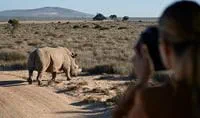The insider: Saving Asia’s Elephants
Harriet Whitmarsh, Destination Manager and Responsible Travel advocate for Scott Dunn, caught up with Lek Chailert, the founder of Elephant Nature Park in northern Thailand, who has won many awards for her work to save Asia’s elephants. Here, she tells us more about her project and how tourists have a responsibility to choose ethical elephant encounters.
12 August 2021

How did your organization come about?
I was working in the tourism industry and I saw the negative treatment of elephants for entertainment. I wanted to educate people and create a new trend of tourism, where travelers care about elephants and behave responsibly.
Tell us a bit about the elephants you’re fighting to save.
I’ve rescued over 100 elephants, and each one has its own story, some have been used for street begging or in the logging business, but mostly I rescue them from the tourism industry, where they have been used for riding or elephant circuses. Our sanctuary provides a permanent home for the elephants. Many have worked for humans for six or seven decades, and often when they arrive with us they have lost eyes, become lame or have no teeth to chew with. They arrive like zombies, many don’t even know they are an elephant, their spirit has been broken. Some of them are very shy and others are very aggressive. We help them return to health – we provide them with food, love and care and try to make sure they live as long as possible.
 Thai Elephant Herd
Thai Elephant Herd Lek Chailert
Lek ChailertWhat are the big issues you face at the moment?
First of all, elephant tourism generates huge amounts of money and it’s also a big part of the culture. To change something believed to be traditional culture is a big challenge. Some people have opened their mind and understand the need for change, but others are stuck in the past. Many people think I shouldn’t interfere with their business, but I hope that one day responsible tourism will prevail. Last year, the Tourism Authority of Thailand made responsible tourism their focus, and Elephant Nature Park was chosen as the winner of the Responsible Thailand Awards. This has made a positive example of our project and is something we can shout about, it shows that TAT approve of our work.
 Lek Chailert
Lek Chailert Elephant Nature Park
Elephant Nature ParkWhat are your core aims?
My core aim is to engage with the local community to put a stop to elephant camps. A lot of businesses continue to mistreat elephants because they don’t know how to stop. They feel insecure and rely on the money that elephant tourism brings them. They don’t know that there is a market for ethical experiences which appeal to a new type of tourist, and they don’t understand the deep environmental problems. My aim is to use our project as a center of education. We want to use our model to create widespread change. We use the money from our project to help the local community, including women’s groups, libraries, public toilets and temples.
 Thai Elephant
Thai Elephant Lek Chailert
Lek ChailertHow do you work to achieve these aims?
We work in partnership with the local community, and we want our visitors to see what their money is going towards. We set up a gift shop, where people from the local community sell crafts and soft drinks, as well as offering traditional massages to earn money. Every day, people from the local community come to Elephant Nature Park and interact with our volunteers and visitors. We share our income with them. They have also opened a homestay and we allow the tourists who stay there to visit our project for free. We believe that if the community around us isn’t strong, we can’t expect our project to be strong. We must grow together and work together.
 Lek Chailert
Lek Chailert Thai Elephant
Thai ElephantDo you feel you’ve made progress?
Yes we’ve made a lot of progress. When we arrived 10 years ago, the land was used for illegal logging and much of the forest had been cleared, but we have successfully brought it back. We employed a man who used to work in the logging industry and now we have changed his mind completely; him and his family have become protectors of the environment. We have seen the community grow stronger, we have seen women with no voice become leaders. Many children continue to higher education and the village has received a number of awards from the government. UNICEF picked us for a partnership because we use the money from our project to support the local school. We believe in education for all and have helped to integrate refugees and minorities into the community to study with the local children.
How can people get involved and help?
We want people to come to Thailand and experience everything we have to offer and see our elephants, but to do so in an ethical and responsible way. I don’t blame the tourists because often they don’t know the harm they are causing, but I hope they will learn to respect elephants and recognise they have feelings and emotions like us. In Thailand, it’s not just elephants that are used in the tourism industry; monkeys, tigers, crocodiles and snakes are all used in shows. It’s hard to stop this happening in Asia while there is still a market for it, so we need to educate tourists to say no to animal cruelty – they are the people that will help us spread the message around the world. It’s time for tourists to start traveling with care, without disturbing any life. You can visit www.asianelephantprojects.com to see all the elephant projects in Asia that I have overseen, past and present. You might not go to a project that I have managed, but it’s about doing research and making sure the project that you’re going to visit is ethical. Check Instagram, check Facebook, check TripAdvisor. Speak to people who have been before. Don’t always believe it’s a sanctuary just because it’s called a sanctuary – this is something which is catching a lot of people out. We also want people who visit our projects to become an ambassador for elephants. Go home and tell people not to ride elephants and not to visit projects that aren’t ethical.
Other blogs you may also be interested in...
Why Scott Dunn?
Unique to You

- We listen to your travel goals and craft unique trips that are personalized to you.
- We’re with you every step of your life’s travel journey, from honeymoons to family trips and beyond.
Seamless Service

- Global offices in the UK, US, and Singapore for 24/7 seamless service.
- We offer flexibility if your plans change so you can book with confidence and peace of mind.
Carefully Curated Collection

- We’ve curated an elevated collection of accommodation, experiences, and guides.
- Committed to fostering close global relationships to continue bringing you unique experiences.
Luxury in Every Sense

- We deliver a sense of luxury that matters most to you.
- Awarded Condé Nast Traveler’s Top Travel Specialists in the World 12 years in a row.




